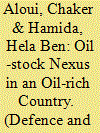| Srl | Item |
| 1 |
ID:
178629


|
|
|
|
|
| Summary/Abstract |
In this paper, we attempt to delineate the relevance of geopolitical risk in the oil-stock nexus in a time-frequency domain. We resort to various wavelet coherence methods to capture the influence of geopolitical risk on the dynamic association between oil and stock prices in Saudi Arabia as a rich oil-exporting country in a region with high geopolitical risk. We primarily show that the role of geopolitical risk in the oil-stock interplay varies through timescales and investment horizons. News regarding geopolitical tensions affects the stock market in high frequency bands, while oil impacts are manifested more on longer time-horizons. Geopolitical risk weakens oil-stock connectedness in the short term. Interestingly, geopolitical incidents significantly lower the oil-stock magnitude and volatility correlation. These results offer prominent insights for investors and policy makers, which may be beneficial when responding to future geopolitical tensions in terms of risk management and the identification of investment opportunities.
|
|
|
|
|
|
|
|
|
|
|
|
|
|
|
|
| 2 |
ID:
094921


|
|
|
|
|
| Publication |
2010.
|
| Summary/Abstract |
In this paper, we evaluate the value-at-risk (VaR) and the expected shortfalls for some major crude oil and gas commodities for both short and long trading positions. Classical VaR estimations as well as RiskMetrics and other extensions to cases considering for long-range memory, asymmetry and fat-tail in energy markets volatility were conducted. We computed the VaR for three ARCH/GARCH-type models including FIGARCH, FIAPARCH and HYGARCH. These models were estimated in the presence of three alternative innovation's distributions: normal, Student and skewed Student. Our results show that considering for long-range memory, fat-tails and asymmetry performs better in predicting a one-day-ahead VaR for both short and long trading positions. Moreover, the FIAPARCH model outperforms the other models in the VaR's prediction. These results present several potential implications for energy markets risk quantifications and hedging strategies.
|
|
|
|
|
|
|
|
|
|
|
|
|
|
|
|
| 3 |
ID:
094290


|
|
|
|
|
| Publication |
2010.
|
| Summary/Abstract |
While there is a large body of empirical studies on the relationship between crude oil price changes and stock market returns, they have failed to achieve a consensus on this subject. In this paper, we combine wavelet analysis and Markov Switching Vector Autoregressive (MS-VAR) approach to explore the impact of the crude oil (CO) shocks on the stock market returns for UK, France and Japan over the period from January 1989 to December 2007. Our procedure involves the estimation of the extended MS-VAR model in order to investigate the importance of the resultant wavelet filtering series (after removing random components) in determining the behavior of the stock market volatilities. We show that CO shocks do not affect the recession stock market phases (except for Japan). However, they significantly reduce moderate and/or expansion stock market phases temporarily. Moreover, this negative relationship appears to be more pronounced during the pre-1999 period. The empirical findings will prove extremely useful to investors who need to understand the exact effect of international oil changes on certain stocks prices as well as for policy managers who need a more thorough evaluation about the efficiency of hedging policies affected by oil price changes.
|
|
|
|
|
|
|
|
|
|
|
|
|
|
|
|